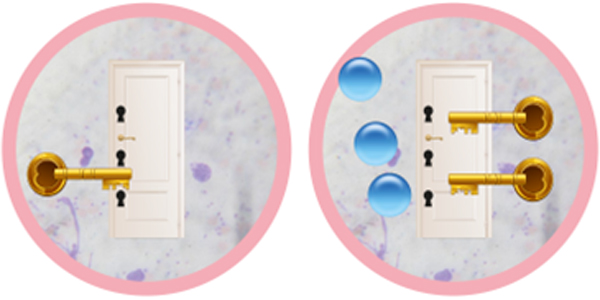When you have diabetes, your body can’t control glucose levels in your blood because you are either not making enough insulin, or the insulin being made is not working properly.
Diabetes is a lifelong condition, but careful management of type 2 diabetes can slow down the rate of progression. Many people can manage their type 2 diabetes with lifestyle measures and medications for many years. Attending your check-ups at the GP practice regularly, eye screening, looking after your feet and following a balanced lifestyle can ensure fewer problems occur.
What happens in Type 2 diabetes
When we eat foods containing carbohydrates, the carbohydrate is digested into glucose in our stomach and it will then travel into our blood stream. The glucose needs to move from the blood stream into our cells, which are all around our body, mostly around our muscles. Once glucose is in the cells it can make energy.
Imagine every cell in our body has a lock on it. You need insulin (the key) to unlock the cell door and let the glucose into the cell. Insulin is made in the pancreas.
In Type 2 diabetes the insulin key doesn’t work properly in the cell lock. Most often, one insulin key is not enough to unlock the cell door, so we need to make more keys. This is known as Insulin Resistance.
There are ways you can help the insulin keys to work properly, or to make more keys.
Can Type 2 diabetes be reversed?
Yes!
Research has shown that for anyone who is overweight, losing weight is most likely to reverse type 2 diabetes. You can do this through diet and lifestyle change, the diabetes remission programme or surgery. Losing around 15kgs (or around 10-15% of your body weight) greatly increases your chances of remission.
Many people that have type 2 diabetes carry extra weight around their stomach. This leads to fat building up around important organs such as the pancreas and liver, stopping them from working properly, which results in diabetes. Losing weight, and the fat around these organs, allows them to work properly again which can put your diabetes into remission.
If you would like to put your diabetes into remission by losing weight it’s important to get advice from the right health care professional. We can help you to do it safely, especially if you have any other health conditions, and increase your chances of successfully achieving remission.
The definition of remission is when you have 2 HbA1c results less than 48mmol/mol, at least 6 months apart, and you have not taken any diabetes medications for 3 months. Achieving diabetes remission can have a huge impact on both your diabetes and your overall health and well-being.
It’s important to note that remission isn’t a complete cure, so diabetes may still come back. It’s crucial to continue with a healthy diet and lifestyle.




